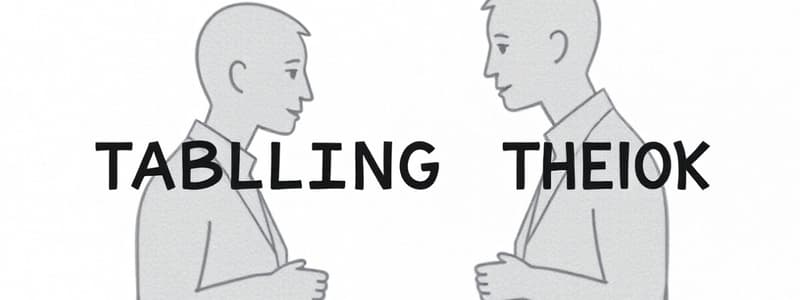Podcast
Questions and Answers
What is the primary focus of interactionist theories regarding crime?
What is the primary focus of interactionist theories regarding crime?
- Systematic patterns of criminal behavior
- The influence of economic factors
- Individual interactions and meanings (correct)
- The structures of society
What does Becker's labelling theory suggest about deviant behavior?
What does Becker's labelling theory suggest about deviant behavior?
- It results from societal reactions and labels (correct)
- It is inherent in certain individuals
- It is a result of economic deprivation
- It is only identified after a crime is committed
What distinguishes primary deviance from secondary deviance?
What distinguishes primary deviance from secondary deviance?
- Primary deviance is never acknowledged socially.
- Primary deviance occurs only among known criminals.
- Secondary deviance is when an individual is labeled as deviant. (correct)
- Secondary deviance is seen as a rare occurrence.
According to interactionist explanations, what role do institutions like the police and courts play in crime?
According to interactionist explanations, what role do institutions like the police and courts play in crime?
How do interactionists view the concept of crime?
How do interactionists view the concept of crime?
What is the concept of a self-fulfilling prophecy as described by Philips and Bowling?
What is the concept of a self-fulfilling prophecy as described by Philips and Bowling?
Who is credited as the founding figure of interactionism in relation to deviance?
Who is credited as the founding figure of interactionism in relation to deviance?
What aspect of crime does interactionism emphasize compared to structuralism?
What aspect of crime does interactionism emphasize compared to structuralism?
According to Philips and Bowling, what is a consequence of the disproportionate stop and search of black men?
According to Philips and Bowling, what is a consequence of the disproportionate stop and search of black men?
How do Functionalists view the stop and search rate policy suggested by Philips and Bowling?
How do Functionalists view the stop and search rate policy suggested by Philips and Bowling?
How can interactionist ideas influence social policy?
How can interactionist ideas influence social policy?
What rationale does Murray provide for the increased stop and search rates among black men?
What rationale does Murray provide for the increased stop and search rates among black men?
What criticism is directed at the views of Philips and Bowling?
What criticism is directed at the views of Philips and Bowling?
How are middle-class juveniles typically defined in the context of juvenile justice?
How are middle-class juveniles typically defined in the context of juvenile justice?
What concept is associated with Stan Cohen's analysis of youth subcultures?
What concept is associated with Stan Cohen's analysis of youth subcultures?
According to Marxists, what role do the police play in the context of social control?
According to Marxists, what role do the police play in the context of social control?
What criticism do McRobbie and Thornton have about Cohen's ideas?
What criticism do McRobbie and Thornton have about Cohen's ideas?
What is one key characteristic of how moral panics can be formed, as described in Cohen's analysis?
What is one key characteristic of how moral panics can be formed, as described in Cohen's analysis?
Which of the following best explains Cicourel's perspective on juvenile justice?
Which of the following best explains Cicourel's perspective on juvenile justice?
What do folk devils represent according to Cohen's framework?
What do folk devils represent according to Cohen's framework?
What aspect of modern media does Castells suggest reduces the likelihood of moral panic?
What aspect of modern media does Castells suggest reduces the likelihood of moral panic?
What is the first stage of the labelling process identified by Becker?
What is the first stage of the labelling process identified by Becker?
How can a label become a master status according to Becker?
How can a label become a master status according to Becker?
What might happen as a result of a self-fulfilling prophecy in the labelling process?
What might happen as a result of a self-fulfilling prophecy in the labelling process?
In what way can individuals assert their identity according to Becker?
In what way can individuals assert their identity according to Becker?
What led to the successful outlawing of cannabis in the USA according to Becker?
What led to the successful outlawing of cannabis in the USA according to Becker?
What is an example of a belief that was leveraged in the campaign against cannabis?
What is an example of a belief that was leveraged in the campaign against cannabis?
Which of the following reflects a misconception about labelling in Becker's theory?
Which of the following reflects a misconception about labelling in Becker's theory?
What role do moral entrepreneurs play in the labelling process?
What role do moral entrepreneurs play in the labelling process?
What term did Becker use to describe the campaign related to moral movements?
What term did Becker use to describe the campaign related to moral movements?
According to Cicourel, what role do police play in the labelling of youth?
According to Cicourel, what role do police play in the labelling of youth?
What is the first stage in the process of defining a young person as delinquent according to Cicourel?
What is the first stage in the process of defining a young person as delinquent according to Cicourel?
What factors influence the police's decision to label a young person as suspicious?
What factors influence the police's decision to label a young person as suspicious?
Cicourel's findings showed that middle-class juveniles were less likely to be charged with an offense because:
Cicourel's findings showed that middle-class juveniles were less likely to be charged with an offense because:
What did Cicourel discover about the relationship between social class and delinquency?
What did Cicourel discover about the relationship between social class and delinquency?
How do middle-class parents influence the labelling process of their children?
How do middle-class parents influence the labelling process of their children?
What is the significance of the 'meanings' held by police in the context of delinquency?
What is the significance of the 'meanings' held by police in the context of delinquency?
Flashcards
Interactionist Perspective
Interactionist Perspective
A perspective that emphasizes the role of social interactions and meanings in shaping our understanding of crime.
Social Construction of Crime
Social Construction of Crime
The idea that crime is not an objective fact but rather a social construct, defined and made meaningful through social processes.
Labelling Theory
Labelling Theory
The process by which individuals are labelled as deviant or criminal, often leading to further deviance.
Primary Deviance
Primary Deviance
Signup and view all the flashcards
Secondary Deviance
Secondary Deviance
Signup and view all the flashcards
Rule Makers
Rule Makers
Signup and view all the flashcards
Interactionist Approach to Social Policy
Interactionist Approach to Social Policy
Signup and view all the flashcards
Howard Becker
Howard Becker
Signup and view all the flashcards
Moral Entrepreneur
Moral Entrepreneur
Signup and view all the flashcards
Label Acceptance
Label Acceptance
Signup and view all the flashcards
Master Status
Master Status
Signup and view all the flashcards
Self-Fulfilling Prophecy
Self-Fulfilling Prophecy
Signup and view all the flashcards
Label Rejection
Label Rejection
Signup and view all the flashcards
Label Negotiation
Label Negotiation
Signup and view all the flashcards
Outlawing
Outlawing
Signup and view all the flashcards
Campaigning
Campaigning
Signup and view all the flashcards
Negotiation of Justice
Negotiation of Justice
Signup and view all the flashcards
Meanings Held by the Police
Meanings Held by the Police
Signup and view all the flashcards
Interactions Between Police and Individuals
Interactions Between Police and Individuals
Signup and view all the flashcards
Labelling Process
Labelling Process
Signup and view all the flashcards
Picture of the Typical Delinquent
Picture of the Typical Delinquent
Signup and view all the flashcards
Negotiating on Behalf
Negotiating on Behalf
Signup and view all the flashcards
Social Class and Delinquency
Social Class and Delinquency
Signup and view all the flashcards
Racial Profiling
Racial Profiling
Signup and view all the flashcards
Culture of Distrust and Defiance
Culture of Distrust and Defiance
Signup and view all the flashcards
Functionalist Perspective on Police Activity
Functionalist Perspective on Police Activity
Signup and view all the flashcards
Negotiable Justice
Negotiable Justice
Signup and view all the flashcards
Marxist Critique of Cicourel
Marxist Critique of Cicourel
Signup and view all the flashcards
Moral Panic
Moral Panic
Signup and view all the flashcards
Folk Devil
Folk Devil
Signup and view all the flashcards
Deviance Amplification
Deviance Amplification
Signup and view all the flashcards
Mods and Rockers Study
Mods and Rockers Study
Signup and view all the flashcards
Cohen's Deviance Amplification
Cohen's Deviance Amplification
Signup and view all the flashcards
McRobbie and Thornton's Critique
McRobbie and Thornton's Critique
Signup and view all the flashcards
Study Notes
Interactionist Explanations of Crime
- Interactionism contrasts with structuralist theories (functionalism, Marxism, feminism)
- Interactionists focus on the micro-level interactions between individuals rather than large-scale social structures
- Crime is socially constructed, meaning it's not inherently fixed, but relative and influenced by time and culture
- Crime and criminals are created through social interaction with the police, courts, and media
- Howard Becker's labelling theory: deviancy isn't inherent in the act, but results from the application of rules and sanctions by others
- Primary deviance: most people commit deviant acts, but only some are labelled
- Secondary deviance: the process of being labelled and having a deviant identity reinforce further deviance, creating a self-fulfilling prophecy
Howard Becker (1963)
- Identified a five-stage labelling process:
- Moral entrepreneurs attempt to label an act as deviant
- The labelled person may accept the label
- The label can become a master status overriding other aspects of their identity
- A self-fulfilling prophecy might occur, where the label leads to further deviance
- A person can reject the label or negotiate meaning, influencing their self-concept
- Becker's example of cannabis use in the USA illustrates how a moral crusade can lead to criminalization.
Cicourel (Negotiation of Justice)
- Cicourel studies how police practices affect labelling
- Police have pre-conceived notions about what constitutes suspicious/criminal behavior in specific areas, influencing their interactions with people and their potential arrest
- Interactions are influenced by the appearance, communication style, etc. of the individuals, creating a 'negotiable' justice system.
- Interaction between the police and individuals influences the outcomes for those interactions.
- The outcome is affected by social factors and social class.
Criticisms of Becker
- Akers criticizes Becker for failing to explain why particular groups are labeled as deviant.
- Functionalists argue that Becker neglects that some individuals commit crimes for specific reasons.
- Neo-Marxists argue that labelling of certain groups serves to distract from broader societal issues (e.g. capitalist economic problems).
Cohen's Deviance Amplification
- Cohen's study of Mods and Rockers highlights moral panics and how media can amplify deviance.
- He explores the creation of a 'folk devil' image, and how media coverage creates fear and social concern, in turn amplifying the problem
- Criticism- media coverage is now more varied, including user-generated content, meaning that deviancy amplification may not be as effective
Philips and Bowling (racial profiling)
- Philips and Bowling argue that the police disproportionately target ethnic minorities, particularly black men, leading to a self-fulfilling prophecy
- They suggest racial profiling contributes to higher arrest rates in these groups
- This issue also raises concerns about the fairness and equality of policing practices.
- Criticism- Functionalists believe that this unequal police approach is necessary for certain social groups and is justified for societal purposes.
Studying That Suits You
Use AI to generate personalized quizzes and flashcards to suit your learning preferences.




